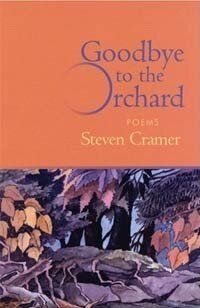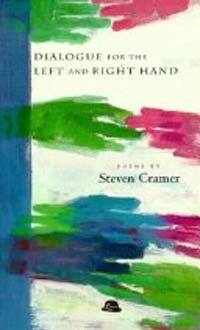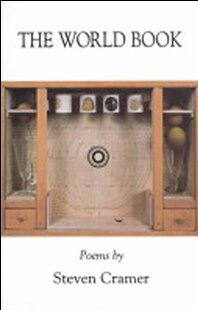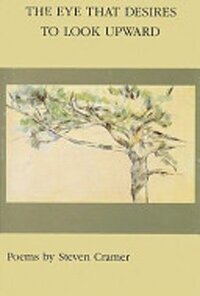FEATURED POET/WRITER
Steven Cramer
Listen is Steven Cramer’s sixth poetry collection. His previous books of poetry are The Eye that Desires to Look Upward (Galileo Press, 1987), The World Book (Copper Beech Press, 1992), Dialogue for the Left and Right Hand (Lumen Editions/Brookline Books, 1997), Goodbye to the Orchard (Sarabande Books, 2004)—winner of the 2005 Sheila Motton Prize from the New England Poetry Club and named a 2005 Honor Book in Poetry by the Massachusetts Center for the Book—and Clangings (Sarabande Books, 2012).
His poems and reviews have appeared in The Atlantic Monthly, Field, Kenyon Review, The Nation, The New Republic, The Paris Review, Ploughshares, Poetry, and other journals. His work is represented in anthologies such as The Autumn House Anthology of Contemporary American Poetry (Autumn House Press, 2005 and 2011), The Book of Villanelles (Knopf Everyman’s Library Pocket Poets Series, 2012), and The POETRY Anthology, 1912–2002 (Ivan R. Dee, 2002). He has also written essays for Simply Lasting: Writers on Jane Kenyon (Graywolf Press, 2005); Touchstones: American Poets on a Favorite Poem (Middlebury College Press, 1996); and Until Everything Is Continuous Again: American Poets on the Recent Work of W. S. Merwin (WordFarm, 2012).
Recipient of two grants from the Massachusetts Cultural Council and a National Endowment for the Arts fellowship, he has taught literature and writing at Bennington College, Boston University, M.I.T., and Tufts University; and he founded and now teaches in the Low-Residency MFA Program in Creative Writing at Lesley University in Cambridge, Massachusetts.
Latest Release: Listen
Book trailer, Listen by Steven Cramer
Listen (MadHat Press, October 2020)
Steven Cramer’s sixth poetry collection generates scores of illuminating juxtapositions: the privacy of a son’s shower-aria and the public lies spewed by the demagogue; what Martin Luther, The Thinker, and Charmin have in common; Renaissance garb—the stomacher, pincnets—wrapped in a headline announcing the moon-landing, to name just a few. Listen begins by facing and facing down the paradox Dickinson called “that White Sustenance/Despair,” and ends its journey nearby the “questionable sea” of emotional autonomy. Along the way, there are poems that vivify the magical thinking which shapes, or misshapes, our deepest attachments, as well as the impingements of the so-called world on the so-called self. Experimenting with many verse forms to give shape to the mind’s restless shifts and associations—sometimes absurdly funny, bracingly honest, and always sharp in thought and craft—the lyric testimony of Listen reaffirms the indispensable, if fragile, consolations of art.
In his sixth collection of poetry, Steven Cramer looks at and through the fogs of memory and depression. In Listen, Cramer tries to distill a “bedlam of thought.” He is, by turns, matter of fact, nailing the sometimes-funny sometimes-sad absurdity of the world and warmly sensual.
—Nina McLaughlin, The Boston Globe
Incisive and various in its approaches, Listen deploys blank verse, tight quatrains, prose poems, and adaptations of international poets in the service of a full heart and open mind. The speakers of these poems, while serious, often resist taking their speech too seriously: So much of our lives we live over our heads! captures the book's irreverent affection for our so-called selves.
—Ploughshares, Editors’ Shelf
Listen
Can that really be Walt Whitman
on a wax cylinder chanting “America”—
Centre of equal daughters, equal sons. . .?
Sounds like he’s gargling pebbles,
his larynx literally form’d of this soil.
In fact, he sounds like Uncle George,
the one man in my family to kill
Krauts in World War II and return
drunk again. Most mornings he nursed
the same German stein. So badly
did he stutter, you’d think he licked
all the alum off his styptic pencil . . .
Some speculate that Edison recorded
Whitman’s trebly voice—another thing
linking him to Lincoln—in West Orange,
town I visited nearly every weekend since
I adored my cousin Al, George’s son.
Al’s mother’s name. . . Aunt . . . Aunt. . .
I don’t remember. I could phone Marti—
the other of two siblings out of four
left alive past sixty. Family genealogist,
she’s traced Dad’s line to Mary Chilton,
first woman ashore at Plymouth, entitling me
to Lowell’s title, “Mayflower Screwball.”
Why? Well, Marti found an 1830
Mendham census designating lunatick
as Nathan Cooper Cramer’s occupation;
Dad chatted with his brother, Alfred,
dead since Anzio, in his shaving mirror;
and after ECT, TMS, and other acronyms
for stir-fried brains, McLean’s in my phone.
How the hell did I get here? And what
sector of my face do I first touch
a razor to? The bedlam of thought
I have in mind is a sputter of dis-
sociation you, you only, can talk down.
No shock, then, after Whitman’s high-wire
aria, real or forged; after my pickled uncle’s
PTSD; after the father of the phonograph;
after my Pilgrim forebear who became
an orphan six weeks after touching land,
it’s you I’ll be listening to at the last. How
resonant—the bones of our middle ears.
Note to My First Wife
We leased a two-story coloring book.
The peonies our neighbor planted
between our recto and her verso
turned out plastic to the touch.
She even kept them watered: pretty
funny, like the niblets we bought
in white cans named NO NAME.
But it’s the moon who found us
really hilarious that night—naked,
well-oiled from head to foot—
we swam across Lake MacBride.
No memories of you in snow. . .
I assume you sleep as I do, more
or less. When I can’t, can’t you?
Ginkgo trees canopied our one-
way street, no address to GPS.
Stopped for geese at Fresh Pond,
or the news on mute, I hear you,
also turned down low, say don’t
bother wondering if I’m dead. I do.
Watch Steven Cramer’s reading with Blacksmith House Poetry Series
Hosted by the Cambridge Center for Adult Education, the Blacksmith House Poetry Series brings established and emerging poets and writers to Harvard Square to read from their work. Learn more.
In Fall 2020, Steven presented alongside poet Joyce Peseroff.
Excerpt from Clangings
I hear the dinner plates gossip Mom collected to a hundred. My friends say get on board, but I’m not bored. Dad’s a nap
lying by the fire. That’s why when radios broadcast news, news broadcast from radios gives air to my kinship, Dickey,
who says he’d go dead if ever I discovered him to them. I took care, then, the last time bedrooms banged, to tape over
the outlets, swipe the prints off DVDs, weep up the tea stains where once was coffee. Not one seep from him since.
What, you wander, do I mean? Except for slinging my songs wayward home, how do things in people go? is what I mean.
Sarabende Books, 2012
Book trailer, Clangings by Steven Cramer







